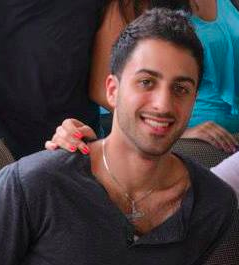Our next guest blogger, Afsheen Sharifzadeh, shares an experience that is all too familiar to many of us. The intersection of culture, tradition and university.
Thank you Afsheen!
Read his experience below!
——————————-

Growing up Iranian-American is a medley tournament of sorts. It’s a circus balancing act with your you, a profound backgammon match versus society’s woes to assimilate, a game of charades in two or three languages, and the finale is a 2,500 year-old relay race with your forefathers.
As the first generation of American-born Iranians comes of age, we face a classic conundrum not unfamiliar to other diasporas. The days of our parents dressing us in folk clothing on holidays, forcing us to attend weekend Persian language schools, and dragging us along to festive dinner parties is a chapter of a closed book in the life of our community. Now, we crack open a blank new volume and make our own inscriptions the way we like.
So, why not start at the university? For the many American born Iranians, the university student organizations are a thing to be cherished. They’re an opportunity for us to reconcile our Iranian identity with the imminent transformation into our adult selves. Here is a playground for us alone—the youth—to bring to life our own manifestations of the motherland.
When I revitalized this dying creed at Tufts University, with the help of an enthusiastic and devoted American partner, Alexa Stevens, our enterprise was met with an all-to-familiar air of skepticism. “Why do a bunch of American-borns—some not even Iranian by definition—give a hoot about this stuff,” the new-arrivals would grumble. “They can’t possibly know what it’s truly like to be Iranian, like ‘us.’”
The answer is that the Iranian paradigm is not a monolith. Iran has many narratives. Iran is not in a language, in any particular religion, in mode of dress or even in political borders. Iran is in a soul, in a mindset, and most of all, in a will.
And so our humble group at Tufts took on the challenge of instilling that will within ourselves— to gather around and enjoy traditional food, to speak Persian with each other, to enchant our friends with stories of our homeland and relatives, to organize educational discussions and film screenings for the public, and to orchestrate vibrant holiday celebrations replete with food, dance, music performances and displays. Some of us were Persian, Azeri, Kurdish or Afghan. Some were Jewish or Armenian, some Parsi, and some American or other. The will, however, was one—that of symphonizing our own semblance of the greater Iranian legacy.
Have we moved mountains? Not yet. But it’s on the horizon. Because will is the secret to winning the millennia-old relay race, and now nothing can stop us. Because we know that whether in the sanctuary of a small American university’s multipurpose room, in a stranger’s living room in some far-flung corner of the world, on the thoroughfares of some unfamiliar city or a chance encounter at sea, any two of us will come together and make our own Iran. After all, we’ve already done it once.
